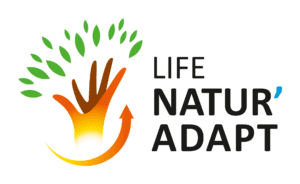LIFE Natur'Adapt project team, 2019
A collective learning process on climate change adaptation in protected areas
Climate is changing Protected area management must adapt to climate change.
In Europe, Réserves Naturelles de France, EUROPARC and eight partners have come together in this LIFE Climate Action project to transform this challenge into an opportunity to innovate.
NaturAdapt aims at triggering a transition towards the adaptive management of protected areas while laying the foundations of a dynamic collective learning process.

Note: We are developing a newsletter to inform the community about the progresses and results of the project. If you wish to receive it, please REGISTER here
DOWNLOAD THE BROCHURE (PDF 2MB)
Project objectives
Concretely, our goal is to support a majority of protected area managers to adopt new adaptive planning and governance tools accounting for Climate Change.
We have set the following objectives for the project:
1. To develop the methods, tools and services that will enable managers to perform climate change vulnerability assessment and develop adaptation plans for natural protected areas
2. To facilitate the access to operational knowledge on adaptation that responds cost-effectively to the effects of climate change
3. To support the emergence of a community of practitioners that will share and collaborate on innovations
4. To raise awareness among all actors of biodiversity development and land use planning on the effects of climate change on the management of nature protected sites.
How do we achieve this?
The project will run over 5 years and is structured around 4 main steps:
> Run an in-depth survey (online and offline) in France and in Europe to better understand the problematics of climate change in Protected Areas and the adoption of adaptive management strategies as well as the needs of PA managers
> Create a community of experts to co-develop methods, services and tools;
> Implement and test the prototypes in the field: 6 pilot sites to start with and 15 mirror sites for further testing;
> Support dissemination and knowledge transfer through the creation of Massive Online Open Courses as well as a toolkit for PA Managers.
What does it mean for EUROPARC members?
The tools and methods developed will initially be tested by a team in France. In parallel, European protected areas will be integrated at all stages of the project through a series of actions undertaken by EUROPARC:
> a survey (online and offline) of current initiatives and needs of managers of natural areas in Europe (Jan- May 2018);
> the creation of a“climate change” commission within EUROPARC (May 2018 – July 2023);
> the drawing up of a white paper for European and national policy makers (Oct 2020);
> the provision of a toolbox and webinars on the issue (Oct 2020).
> The organisation of the 2023 EUROPARC Annual Conference on climate change adaptation and mitigation
I would love to hear from you.
If you have any experience in or questions about adaptive management of protected areas and/or climate change, I’d be delighted to talk about it with you!
Olivier de Sadeleer
Project Manager – LIFE CLIMA
EUROPARC
NaturAdapt in figures:
5 years
The life project #CC #NaturAdapt [LIFE17 CCA/FR/000089] will run from 2018 to 2023
€4.2 M
€2.5M from the European Commission via the LIFE Climate Action programme, €500,000 from the French Ministry for the Ecological and Inclusive Transition, and €500,000 from the French Agency for Biodiversity.
10 partners
Réserves Naturelles de France [Nature Reserves of France], EUROPARC, Muséum National d’Histoire Naturelle [National Natural History Museum], Tela Botanica [French botanist network], LPO [Birdlife], ASTERS – Conservatoire des espaces naturels de Haute-Savoie [Conservatory of Natural Areas in Haute-Savoie], Fédération des réserves naturelles catalanes [Federation of Catalan Nature Reserves], Syndicat mixte du Parc naturel régional du Morvan [Joint Association for the Morvan regional nature park], Syndicat mixte du Parc naturel régional des Volcans d’Auvergne [Joint Association for the Volcans d’Auvergne regional nature park], Association Petite Camargue Alsacienne